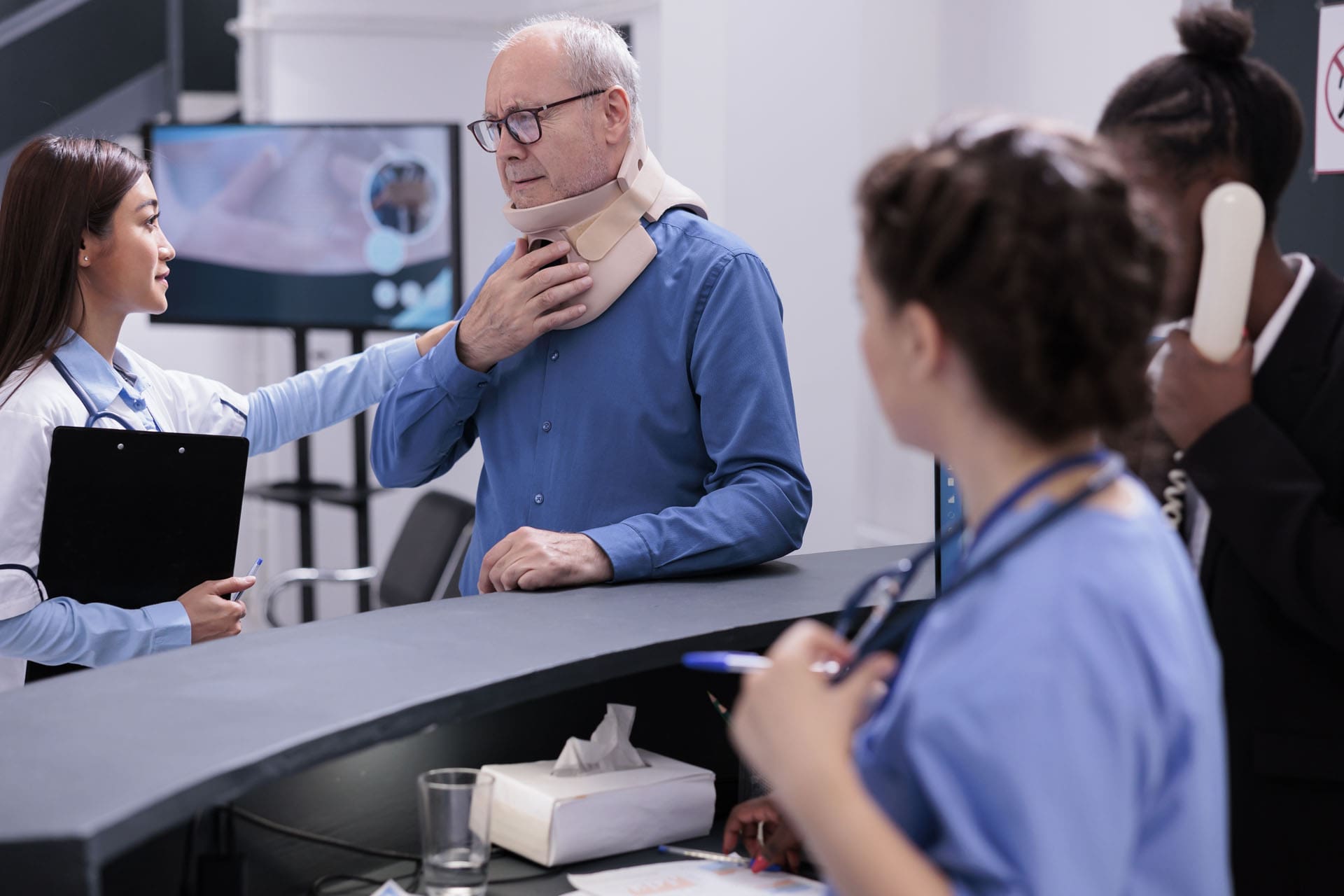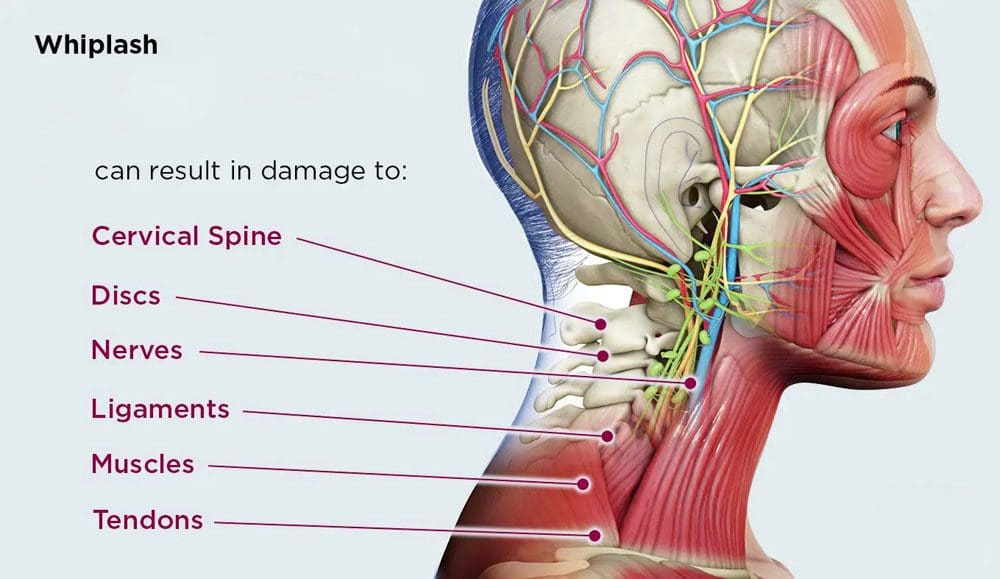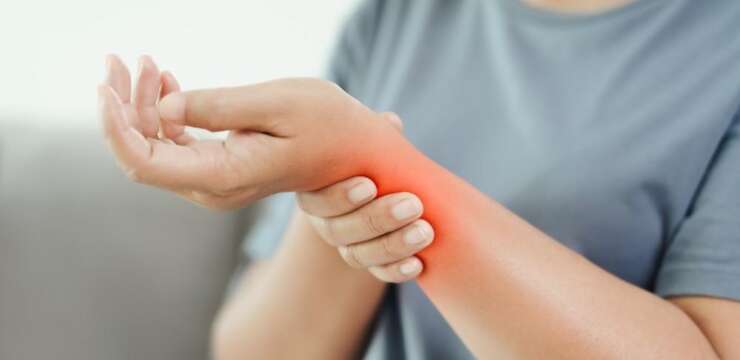
Experiencing a whiplash injury can be disorienting and painful. Can recognizing the signs of more serious complications, seeking timely medical intervention, and following a structured whiplash rehabilitation plan help individuals find relief and restore function and quality of life?

Table of Contents
Whiplash Rehabilitation
For individuals who have recently been in an automobile accident, once the initial neck pain and stiffness have passed, it’s crucial to recognize potential delayed symptoms, such as nerve damage. While many recover quickly, some may experience prolonged symptoms requiring more aggressive treatment and management.
Neck Injury
Whiplash injuries result from sudden, forceful whipping back and forth of the head, commonly occurring in rear-end vehicle collisions, and are one of the most common neck injuries. Other potential causes include: (Johns Hopkins Medicine, 2024)
- Automobile Accidents (American Academy of Physical Medicine and Rehabilitation, 2024)
- Sports injuries
- Falls (Rush University Medical Center, 2014)
Symptoms can include: (Johns Hopkins Medicine, 2024)
- Pain that radiates to the shoulders and/or upper back
- Neck stiffness
- Headaches
Mobility, Flexibility, and Sensations
The symptoms of a neck injury can vary in severity but commonly include: (Johns Hopkins Medicine, 2024) (American Academy of Physical Medicine and Rehabilitation, 2024) (Medline Plus, 2024)
- Neck pain and stiffness are often the most noticeable symptoms and can take several hours to appear and worsen the following day.
- Decreased range of motion
- Difficulty turning or tilting the head
- Tenderness, pain, or stiffness in the shoulders, upper back, or arms – sometimes accompanied by numbness or tingling.
- Having no energy
- Fatigue
- Headaches
- Tiredness and irritability
- Dizziness
- Blurred vision
- Unusual sensations around the face
- Difficulty concentrating or remembering things
Individuals may not feel any symptoms directly following an accident, as it can sometimes take several hours or weeks to develop. (Medline Plus, 2024)
Immediate Medical Attention
Seek immediate medical attention from a healthcare provider or the emergency clinic for any of the following symptoms (NHS, 2023)
- Injured neck and are experiencing severe pain that isn’t relieved by over-the-counter medication.
- Feeling pins and needles or tingling in one or both sides of the body.
- Have difficulty walking or sitting upright.
- Experience a sudden shock sensation in the back or neck, extending into the arms and legs.
- Arms or legs feel weak, as these symptoms may indicate nerve damage in the neck or back.
Temporary Pain Relief
Temporary treatment often involves medications to reduce pain, inflammation, and muscle spasms and include. (University of Rochester Medical Center, 2024)
- Non-steroidal anti-inflammatory Drugs
- Muscle relaxants
- Topical gels
- Injections
- Anticonvulsants for individuals experiencing nerve-related pain or tingling sensations. (Medline Plus, 2020)
Other treatments may include: (University of Rochester Medical Center, 2024)
- Ice usually for the first 24 hours
- Neck brace
- Physical therapy
- Gentle neck exercises
Following a healthcare provider’s recommendations regarding medication use, including dosage and duration, is critical to managing symptoms while effectively minimizing potential side effects.
Rehabilitation Steps
To determine the appropriate treatment whiplash rehabilitation plan, a healthcare provider will assess how much the pain affects daily life, including mental health and the ability to do regular activities (American Academy of Physical Medicine and Rehabilitation, 2024). X-rays or other imaging tests will be done to determine how serious the damage to the neck or spine is. Resting and icing the injured area are recommended to relieve inflammation. A provider may recommend slowly increasing neck movements several times daily and continuing with normal daily activities, as exercise will help maintain flexibility. Not moving the neck may prolong pain, stiffness, and healing. Physical therapy may be recommended if symptoms continue for over one or two weeks. (American Academy of Physical Medicine and Rehabilitation, 2024)
How Soon Until Pain and Symptoms Resolve
Whiplash rehabilitation healing and restoration of function depend on the severity of the injury. Many recover quickly; however, in extreme cases, pain and other symptoms can last 12 months or longer. (American Academy of Physical Medicine and Rehabilitation, 2024) It is recommended to see a provider if: (Johns Hopkins Medicine, 2024)
- Pain worsens
- Symptoms last longer than the healthcare provider estimated
- Other symptoms develop, like weakness, numbness, or a sensation of pins and needles.
Long-Term Injury Side Effects
Individuals in whiplash rehabilitation usually recover in a few weeks to months, but some may have longer-lasting pain as the injury can cause nerve damage. (Fundaun J. et al., 2022) Discuss any new or worsening symptoms with a healthcare provider for guidance. (Johns Hopkins Medicine, 2024)
Chronic Neck and Back Pain Management
Treatments for chronic neck and back pain include: (National Institute of Arthritis and Musculoskeletal and Skin Diseases, 2023)
- Physical therapy to help strengthen muscles.
- Acupuncture.
- Non-surgical decompression.
- Over-the-counter pain relievers, such as acetaminophen or NSAIDs.
- Muscle relaxants for tightness and tension.
- Prescription pain medications.
If pain becomes chronic, antidepressants such as serotonin and norepinephrine reuptake inhibitors may be prescribed. These medications can help manage pain and improve sleep quality. (Ferreira G. E. et al., 2023) For severe inflammation and pain, corticosteroid injections directly into the affected area can provide relief. Healthcare providers administer these injections, offering long-lasting effects. (Harvard Health Publishing, 2015)
Injury Medical Chiropractic and Functional Medicine Clinic
Navigating a whiplash injury can be challenging, but understanding the whiplash rehabilitation process can significantly aid in recovery. A healthcare provider can determine the most effective treatment strategies. It is important to talk with a healthcare provider to determine the cause and extent of the injury to provide individualized patient education regarding treatment. This can include physical therapy, rest, health coaching, medication, and surgery, which may be recommended in certain cases. Overcoming these limitations is possible. Injury Medical Chiropractic and Functional Medicine Clinic works with primary healthcare providers and specialists to develop an optimal health and wellness solution. We focus on what works for you to relieve pain, restore function, prevent injury, and help mitigate the pain through spinal adjustments that help the body realign itself. They can also work with other medical professionals to integrate a treatment plan to resolve musculoskeletal issues.
Personal Injury Rehabilitation
References
Johns Hopkins Medicine. (2024). Whiplash Injury. www.hopkinsmedicine.org/health/conditions-and-diseases/whiplash-injury
American Academy of Physical Medicine and Rehabilitation. (2024). Cervical whiplash. www.aapmr.org/about-physiatry/conditions-treatments/musculoskeletal-medicine/cervical-whiplash
Rush University Medical Center. (2014). 5 facts about whiplash. www.rush.edu/news/5-facts-about-whiplash
National Library of Medicine. MedlinePlus. (2024). Whiplash. Retrieved from medlineplus.gov/ency/imagepages/9853.htm
National Health Service NHS. (2023). Whiplash. www.nhs.uk/conditions/whiplash/
University of Rochester Medical Center. (2024). Whiplash injury. www.urmc.rochester.edu/encyclopedia/content.aspx?contenttypeid=85&contentid=p01388
National Library of Medicine. MedlinePlus. (2020). Pregabalin. Retrieved from medlineplus.gov/druginfo/meds/a605045.html
Fundaun, J., Kolski, M., Baskozos, G., Dilley, A., Sterling, M., & Schmid, A. B. (2022). Nerve pathology and neuropathic pain after whiplash injury: a systematic review and meta-analysis. Pain, 163(7), e789–e811. doi.org/10.1097/j.pain.0000000000002509
National Institute of Arthritis and Musculoskeletal and Skin Diseases. (2023). Back pain: diagnosis, treatment, and steps to take. Retrieved from www.niams.nih.gov/health-topics/back-pain/diagnosis-treatment-and-steps-to-take
Ferreira, G. E., Abdel-Shaheed, C., Underwood, M., Finnerup, N. B., Day, R. O., McLachlan, A., Eldabe, S., Zadro, J. R., & Maher, C. G. (2023). Efficacy, safety, and tolerability of antidepressants for pain in adults: overview of systematic reviews. BMJ (Clinical research ed.), 380, e072415. doi.org/10.1136/bmj-2022-072415
Harvard Health Publishing. (2015). New recommendations aim to improve safety of pain-relieving spinal steroid injections. Harvard Health Publishing
Harvard Medical School. www.health.harvard.edu/blog/new-recommendations-aim-to-improve-safety-of-pain-relieving-spinal-steroid-injections-201505077991
Disclaimers
Professional Scope of Practice *
The information herein on "Whiplash Rehabilitation: Managing Prolonged Symptoms" is not intended to replace a one-on-one relationship with a qualified health care professional or licensed physician and is not medical advice. We encourage you to make healthcare decisions based on your research and partnership with a qualified healthcare professional.
Blog Information & Scope Discussions
Welcome to El Paso's wellness blog, where Dr. Alex Jimenez, DC, FNP-C, a board-certified Family Practice Nurse Practitioner (FNP-C) and Chiropractor (DC), presents insights on how our team is dedicated to holistic healing and personalized care. Our practice aligns with evidence-based treatment protocols inspired by integrative medicine principles, similar to those found on dralexjimenez.com, focusing on restoring health naturally for patients of all ages.
Our areas of chiropractic practice include Wellness & Nutrition, Chronic Pain, Personal Injury, Auto Accident Care, Work Injuries, Back Injury, Low Back Pain, Neck Pain, Migraine Headaches, Sports Injuries, Severe Sciatica, Scoliosis, Complex Herniated Discs, Fibromyalgia, Chronic Pain, Complex Injuries, Stress Management, Functional Medicine Treatments, and in-scope care protocols.
Our information scope is limited to chiropractic, musculoskeletal, physical medicine, wellness, contributing etiological viscerosomatic disturbances within clinical presentations, associated somato-visceral reflex clinical dynamics, subluxation complexes, sensitive health issues, and functional medicine articles, topics, and discussions.
We provide and present clinical collaboration with specialists from various disciplines. Each specialist is governed by their professional scope of practice and their jurisdiction of licensure. We use functional health & wellness protocols to treat and support care for the injuries or disorders of the musculoskeletal system.
Our videos, posts, topics, subjects, and insights cover clinical matters, issues, and topics that relate to and directly or indirectly support our clinical scope of practice.*
Our office has reasonably attempted to provide supportive citations and has identified the relevant research studies or studies supporting our posts. We provide copies of supporting research studies available to regulatory boards and the public upon request.
We understand that we cover matters that require an additional explanation of how they may assist in a particular care plan or treatment protocol; therefore, to discuss the subject matter above further, please feel free to ask Dr. Alex Jimenez, DC, APRN, FNP-BC, or contact us at 915-850-0900.
We are here to help you and your family.
Blessings
Dr. Alex Jimenez DC, MSACP, APRN, FNP-BC*, CCST, IFMCP, CFMP, ATN
email: coach@elpasofunctionalmedicine.com
Licensed as a Doctor of Chiropractic (DC) in Texas & New Mexico*
Texas DC License # TX5807
New Mexico DC License # NM-DC2182
Licensed as a Registered Nurse (RN*) in Texas & Multistate
Texas RN License # 1191402
ANCC FNP-BC: Board Certified Nurse Practitioner*
Compact Status: Multi-State License: Authorized to Practice in 40 States*
Graduate with Honors: ICHS: MSN-FNP (Family Nurse Practitioner Program)
Degree Granted. Master's in Family Practice MSN Diploma (Cum Laude)
Dr. Alex Jimenez, DC, APRN, FNP-BC*, CFMP, IFMCP, ATN, CCST
My Digital Business Card






